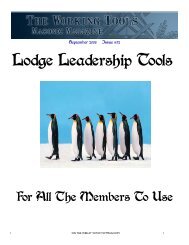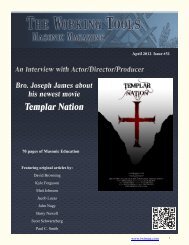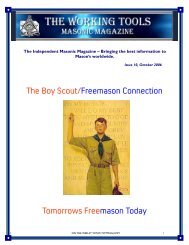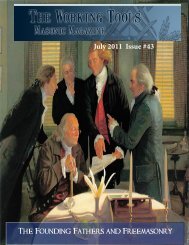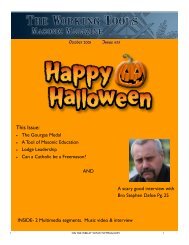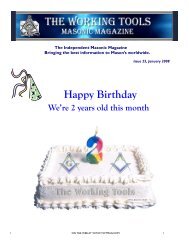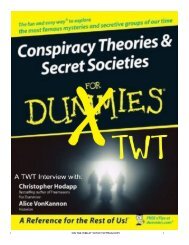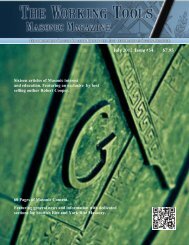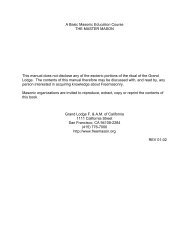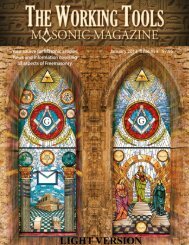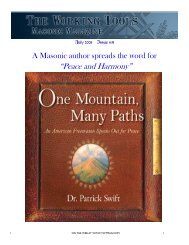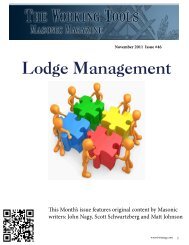The Working Tools Magazine âLightâ Version - Hawthorne-Fortitude ...
The Working Tools Magazine âLightâ Version - Hawthorne-Fortitude ...
The Working Tools Magazine âLightâ Version - Hawthorne-Fortitude ...
Create successful ePaper yourself
Turn your PDF publications into a flip-book with our unique Google optimized e-Paper software.
Masonic Symbolism & Words Brought to you by www.masonicdictionary.com<br />
This Month’s Entry is:<br />
“Calling On and Off”<br />
“Calling Off”<br />
A technical term in Freemasonry which signifies the<br />
temporary suspension of labor in a Lodge without passing<br />
through the formal ceremony of closing. <strong>The</strong> full form of the<br />
expression is to call from labor to refreshment, and it took its<br />
rise from the former custom of dividing the time spent in the<br />
Lodge between the work of Freemasonry and the moderate<br />
enjoyment of the banquet. <strong>The</strong> banquet formed in the<br />
eighteenth century an indispensable part of the arrangements<br />
of a Lodge Communication. "At a certain hour of the<br />
evening," says Brother Oliver, "with certain ceremonies, the<br />
Lodge was called from labor to refreshment, when the<br />
Brethren enjoyed themselves with decent merriment." That<br />
custom no longer exists; and although in England almost<br />
always, and in the United States occasionally, the labors of the<br />
Lodge are concluded with a banquet; yet the Lodge is<br />
formally closed before the Brethren proceed to the table of<br />
refreshment.<br />
Calling off in American Lodges is now only used, in a certain<br />
ceremony of the Third Degree, when it is desired to have<br />
another meeting at a short interval, and the Master desires to<br />
avoid the tediousness of dosing and opening the Lodge.<br />
Thus, if the business of the Lodge at its regular meeting has so<br />
accumulated that it cannot be transacted in one evening, it<br />
has become the custom to call off until a subsequent evening,<br />
when the Lodge, instead of being opened with the usual<br />
ceremony, is simply "called on," and the latter meeting is<br />
considered as only a continuation of the former.<br />
This custom is very generally adopted in Grand Lodges at<br />
their Annual Communications, which are opened at the<br />
beginning of the session, called off from day to day, and<br />
finally closed at its end. We do not know that any objection<br />
has ever been advanced against this usage in Grand Lodges,<br />
because it seems necessary as a substitute for the<br />
adjournment, which is resorted to in other legislative bodies,<br />
but which is not admitted in Freemasonry. But much<br />
discussion has taken place in reference to the practice of<br />
calling off in Lodges, some authorities sustaining and others<br />
condemning it. Thus, many years ago, the Committee of<br />
Correspondence of the Grand Lodge of Mississippi proposed<br />
this question : ''In case of excess of business, cannot the<br />
unfinished be laid over until the next or another day, and<br />
must the Lodge be closed in form, and opened the next, or the<br />
day designated for the transaction of that business?" To this<br />
question some authorities, and among others Brother C. W.<br />
Moore (Freemasons Monthly <strong>Magazine</strong>, volume xii, No,10),<br />
reply in the negative, while other equally good jurists differ<br />
from them in opinion.<br />
<strong>The</strong> difficulty seems to be in this, that if the regular meeting<br />
of the Lodge is closed in form, the subsequent meeting<br />
becomes a special one, and many things which could be done<br />
at a regular communication cease to be admissible. <strong>The</strong><br />
recommendation, therefore, of Brother Moore, that the Lodge<br />
should be closed, and, if the business be unfinished, that the<br />
Master shall call a special meeting to complete it, does not<br />
meet the difficulty, because it is a well settled principle of<br />
Masonic law that a special meeting cannot interfere with the<br />
business of a preceding regular one. As, then, the mode of<br />
briefly closing by adjournment is contrary to Masonic law<br />
and usage, and cannot, therefore, be resorted to, as there is no<br />
other way except by calling off to continue the character of a<br />
regular meeting, and as, during the period that the Lodge is<br />
called off, it is under the government of the Junior Warden,<br />
and Masonic discipline is thus continued, Doctor Mackey, for<br />
the reasons cited by him in regard to Brother Moore, was<br />
clearly of opinion that calling off from day to day for the<br />
purpose of continuing work or business is, as a matter of<br />
convenience, admissible.<br />
<strong>The</strong> practice may indeed be abused. But there is a well-known<br />
legal maxim which says, Ez abusu non arguitur in usum. "No<br />
argument can be drawn from the abuse of a thing against its<br />
use. " Thus, a Lodge cannot be called off except for<br />
continuance of work and business, nor to an indefinite day,<br />
for there must be a good reason for the exercise of the<br />
practice, and the Brethren present must be notified before<br />
dispersing of the time of reassembling; nor can a Lodge at one<br />
regular meeting be called off until the next, for no regular<br />
meeting of a Lodge is permitted to run into another, but each<br />
must be closed before its successor can be opened.<br />
“Calling On”<br />
When a Lodge that is called off at a subsequent time resumes<br />
work or business, it is said to be called on. <strong>The</strong> full expression<br />
is called on from refreshment to labor.<br />
- Source: Mackey's Encyclopedia of Freemasonry<br />
7 www.twtmag.com



